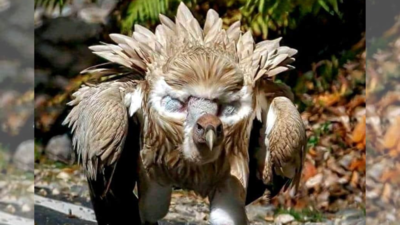According to the WWF report, the number of monitored wild animals fell by 73 percent in just 50 years; experts highlight the alarming loss of vultures in India | News of India – Times of India

NEW DELHI: There has been a sharp 73 per cent drop globally in the average amount of ‘surveillance’. wildlife populations‘ in just 50 years (1970-2020), it said WWF‘s Living Planet Report-2024 with experts highlighting the alarming decline in the population of three types of vultures India between 1992 and 2002.
The report, with the Zoological Society of London’s Living Planet Index (LPI), noted the greatest decline in freshwater populations (85 percent) followed by terrestrial (69 percent) and marine populations (56 percent ) among 34,836 wild animals observed. 5,495 types of vertebrates in aquatic animals, birds, fish, mammals and reptiles.
The report, released on Thursday, also highlights how to environmental degradation and loss of residencedriven primarily by the food system, combined with pollution and climate change are increasing the likelihood of local, regional and global impacts. point of attack – the key factor that causes irreversible change.
In India, it cites the example of Chennai, saying that rapid urban expansion in the city has caused an 85 percent loss in wetlands while leaving people vulnerable to drought and floods.
“When a severe drought hit the area, it caused the city’s major reservoirs to dry up and groundwater levels to decrease in 2019. Without its wetlands to store and replenish its water supply, the city of 11.2 million were left at risk and forced to trudge into the water to meet basic needs such as drinking, cooking and bathing,” the report said.
Referring to a 2022 nationwide survey in India, WWF-India experts noted that the number of white vultures has declined by 67 percent, the Indian vulture by 48 percent, and the griffon vulture by 89 percent while are compared. to their population in 2002.
As vultures provide important ecosystem services by scavenging, restoring nutrients and reducing the transmission of other diseases, he called for an urgent need to protect these vital predators and maintain ecosystem stability.
Giving an example of the increase in the number of tigers, however, they noted that despite the decline in the population of many wild animals in India, some are stable and show recovery mainly due to active government efforts, effective housing management and strong scientific cooperation.
Highlighting the important point, WWF-India experts, including Sejal Worah and Dipankar Ghose, have also identified that more than 36 percent of the country’s forests are estimated to be prone to frequent forest fires, noting that India saw the total forest. 4.48 lakh warnings for forest fires between 2021 and 2024.
At the regional level, the biggest declines in ‘targeted wildlife’ were observed in Latin America and the Caribbean (95 per cent) followed by Africa (76 per cent) and Asia and the Pacific (60 per cent). The report noted that declines were lowest in Europe and Central Asia (35 percent) and North America (39 percent), saying this reflected the fact that significant environmental impacts were already evident before 1970 in these areas.
Noting that more than half of GDP (55 percent) is highly dependent on nature and its services, the report seeks to advance global recovery goals. loss of nature by 2030 by changing energy, food and financial systems.
“Nature gives a message of suffering. Disasters associated with biodiversity loss and climate change are pushing wildlife and ecosystems beyond their limits, with global risk factors threatening to disrupt global ecosystems. life and disrupt social stability. The devastating effects of losing some of our most important ecosystems, such as the Amazon rainforest and coral reefs, would be felt by people and nature around the world,” said Kirsten Schuijt, director- general of WWF International.
#WWF #report #number #monitored #wild #animals #fell #percent #years #experts #highlight #alarming #loss #vultures #India #News #India #Times #India